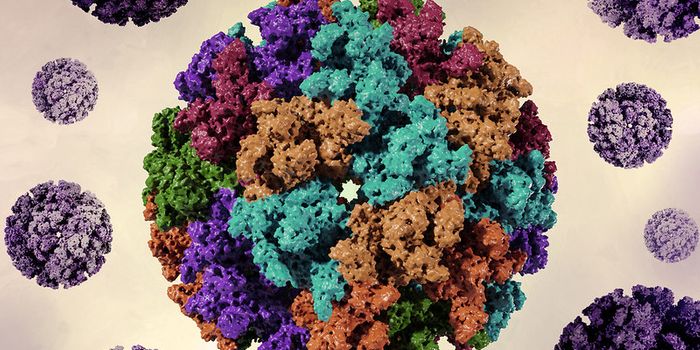Cold Infections Are Less Likely in People That Have the Flu
There may be a small silver lining to getting a cold or the flu; researchers have found that when a person is infected with influenza or a cold-causing rhinovirus, they are less likely to get the other virus. The frequency of cold infections is lower during flu season, and flu is less common when people tend to get colds. Understanding the inhibitory actions of these viruses may help scientists prevent the spread of disease or make better predictions about outbreaks. The findings, which assessed public health data and individual patients, have been reported in the Proceedings of the National Academy of Sciences (PNAS).
"One really striking pattern in our data is the decline in cases of the respiratory virus rhinovirus, which is typically a mild common cold causing virus, occurring during winter, around the time that flu activity increases," said the first author of the report Dr. Sema Nickbakhsh of the MRC-University of Glasgow Centre for Virus Research at the University of Glasgow.
"In the same way as lions and spotted hyenas compete for food resources in the Masai Mara, we believe respiratory viruses may be competing for resources in the respiratory tract. There are various possibilities we're investigating, such as these viruses are competing for cells to infect in the body, or the immune response to one virus makes it harder for another unrelated virus to infect the same person."
In this work, the researchers tested samples collected over nine years from 36,157 patients with 44,230 cases of acute respiratory sickness for eleven kinds of respiratory viruses. They found that 35 percent of the samples contained a virus, and eight percent carried two types of viruses. Using computational tools, they identified a striking, inhibitory interaction between influenza A and rhinoviruses in both individuals and populations. People that had influenza A were about 70 percent less likely to have a cold-causing rhinovirus compared to patients with other types of viruses.
While flu viruses might generate overlapping responses from the immune system, these findings show that totally different types of viruses are interacting in some way.
"Traditionally people have studied viruses in isolation, you study only flu or rhinovirus; but we've shown here that we need to also be studying these viruses together like it's an ecosystem. My team [is] now doing experiments to try and understand how respiratory viruses, including influenza and rhinovirus, interact," said the research leader Dr. Pablo Murcia of the MRC-University of Glasgow Centre for Virus Research at the University of Glasgow.
"If we understand how viruses interact and how certain viral infections may favor or inhibit each other, then maybe we can develop better ways to target viruses. Studying interactions between viruses could help to explain why different viruses circulate in different seasons or why they affect different age groups, and within the body why certain types of viruses infect different parts of the respiratory tract, like the nose or the lungs."
Unfortunately, the study does not indicate how or why this link exists. It also did not assess people that don't get sick when they're infected with either virus.
"A key thing to note with this research is that we're looking at average risks over a very large number of patients who have sought healthcare; that's not to say that occasionally unlucky individuals can't be infected with influenza and a cold virus at the same time," noted Nickbakhsh.
Sources: AAAS/Eurekalert! via UK Research and Innovation, PNAS









